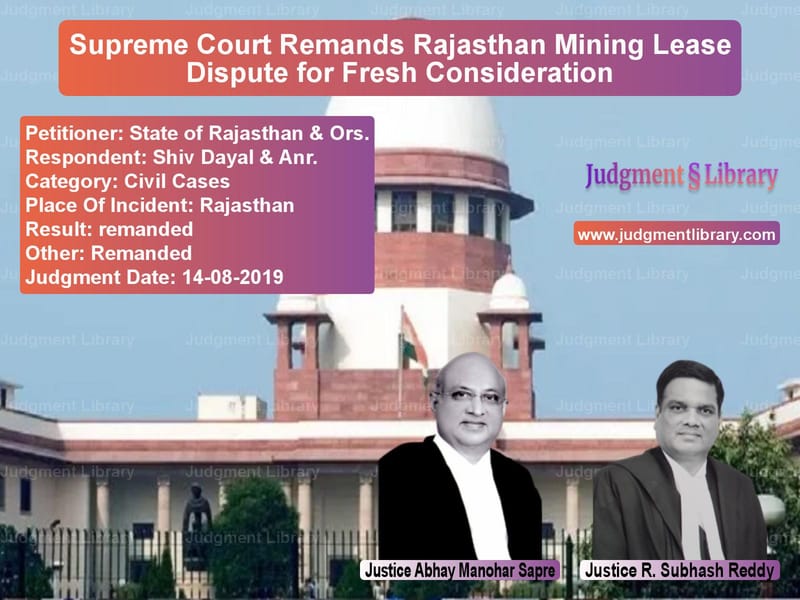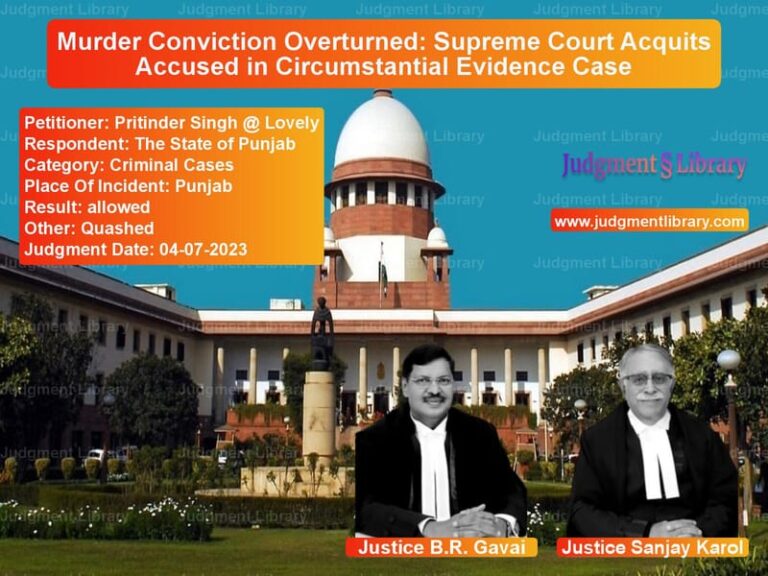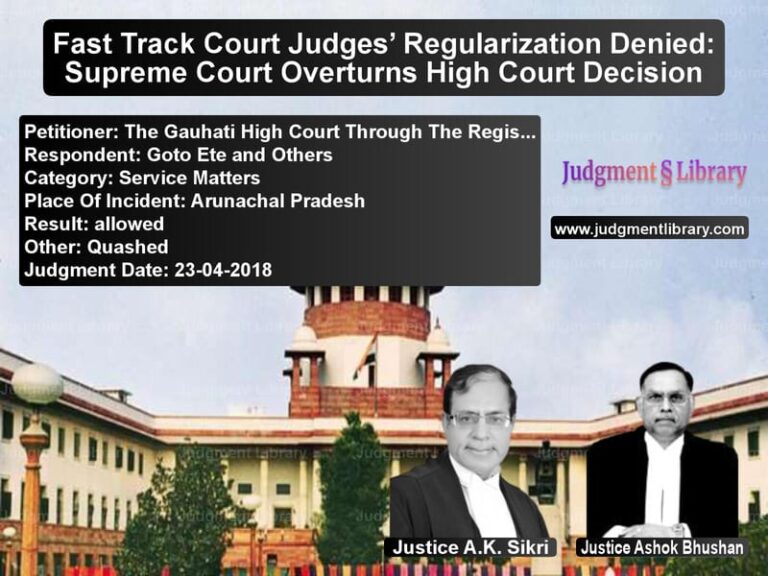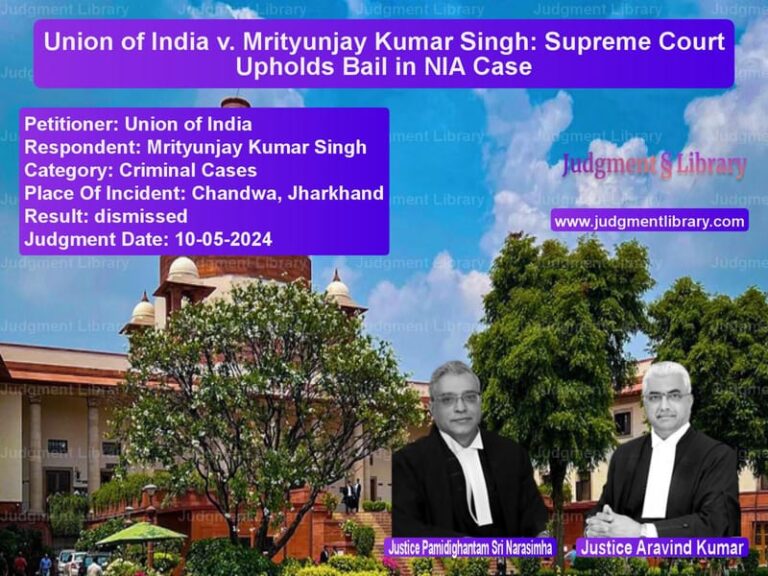Supreme Court Remands Rajasthan Mining Lease Dispute for Fresh Consideration
The case of State of Rajasthan & Ors. vs. Shiv Dayal & Anr. revolves around a legal dispute concerning mining leases and protected forest land. The Supreme Court, in its judgment dated 14th August 2019, remanded the case to the Rajasthan High Court, ruling that several substantial questions of law were left unanswered. The ruling highlights the significance of correctly determining whether land falls under forest or revenue classification before granting mining leases.
Background of the Case
The dispute originated from a civil suit filed by Shiv Dayal, a mining lessee, against the State of Rajasthan and its authorities. He sought a permanent injunction to restrain the State from interfering with his mining operations on the suit land. His claim was based on the assertion that the land was revenue land and not part of a protected forest area.
The trial court ruled in favor of Shiv Dayal, granting the requested injunction against the State. The Rajasthan government appealed, but both the first appellate court and the High Court upheld the trial court’s decision. Consequently, the State of Rajasthan filed an appeal before the Supreme Court.
Key Issues in Dispute
- Whether the suit land was part of a protected forest area.
- Whether the land was revenue land and, if so, whether mining leases could be granted.
- Whether the provisions of the Mines and Minerals (Development and Regulation) Act (MMRD Act) were satisfied.
- Whether the High Court was justified in dismissing the second appeal without framing substantial questions of law.
Arguments by the Petitioner (State of Rajasthan)
- The State argued that the land in question fell within a protected forest area and was subject to restrictions under forest laws.
- The mining lease granted to Shiv Dayal was illegal and in violation of environmental regulations.
- The lower courts erred in treating the land as revenue land without proper verification.
- The High Court failed to consider the case’s legal complexity and should have framed substantial questions of law.
Arguments by the Respondents (Shiv Dayal & Others)
- The suit land was classified as revenue land and did not fall under any forest laws.
- The mining lease was granted lawfully and in accordance with the MMRD Act.
- The lower courts had examined the evidence and found no basis for the State’s claims.
- The State’s objections were raised too late and lacked merit.
Supreme Court’s Observations
1. High Court’s Failure to Frame Substantial Questions of Law
The Supreme Court ruled that the High Court had erred in dismissing the State’s appeal without properly framing and addressing substantial legal questions. It stated:
“The High Court was swayed by the fact that the lower courts had decreed the suit, but that does not mean substantial questions of law did not arise.”
2. Necessity to Determine Land Classification
The Court emphasized that before granting mining leases, it was essential to determine whether the land was forest or revenue land. It observed:
“If the land falls within a protected forest area, mining operations cannot be permitted without fulfilling statutory requirements under the Forest and MMRD Acts.”
3. Legal and Environmental Compliance
The Court noted that the matter involved multiple legal and environmental considerations, requiring thorough judicial scrutiny. It stated:
“The issues at hand require an in-depth examination of forest, revenue, and mining laws, which the High Court failed to address.”
Final Verdict
- The Supreme Court set aside the Rajasthan High Court’s ruling.
- The case was remanded to the High Court for fresh consideration.
- The High Court was directed to frame substantial questions of law and decide the case accordingly.
Implications of the Judgment
- Reaffirms that judicial review in mining and land disputes must consider statutory compliance.
- Ensures that High Courts must frame and answer substantial questions of law before dismissing appeals.
- Clarifies the importance of determining whether land is classified as forest or revenue before granting mining rights.
- Provides a precedent for future cases where land classification affects industrial and environmental policies.
Conclusion
The Supreme Court’s decision in this case underscores the importance of correctly classifying land before granting mining leases. The ruling ensures that disputes involving forest land are thoroughly examined under the relevant environmental and mining laws. By remanding the case, the Court reinforced the duty of High Courts to properly frame and answer substantial legal questions rather than dismissing appeals based solely on concurrent lower court findings.
Petitioner Name: State of Rajasthan & Ors..Respondent Name: Shiv Dayal & Anr..Judgment By: Justice Abhay Manohar Sapre, Justice R. Subhash Reddy.Place Of Incident: Rajasthan.Judgment Date: 14-08-2019.
Don’t miss out on the full details! Download the complete judgment in PDF format below and gain valuable insights instantly!
Download Judgment: State of Rajasthan & vs Shiv Dayal & Anr. Supreme Court of India Judgment Dated 14-08-2019.pdf
Direct Downlaod Judgment: Direct downlaod this Judgment
See all petitions in Landlord-Tenant Disputes
See all petitions in Judgment by Abhay Manohar Sapre
See all petitions in Judgment by R. Subhash Reddy
See all petitions in Remanded
See all petitions in Remanded
See all petitions in supreme court of India judgments August 2019
See all petitions in 2019 judgments
See all posts in Civil Cases Category
See all allowed petitions in Civil Cases Category
See all Dismissed petitions in Civil Cases Category
See all partially allowed petitions in Civil Cases Category







